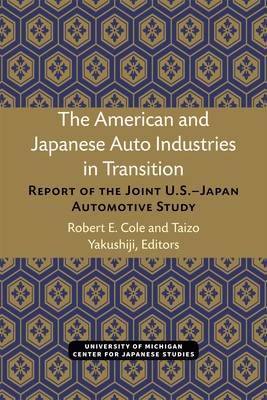
- We will send in 10–14 business days.
- Publisher: U of M Center for Japanese Studies
- ISBN-10: 0939512289
- ISBN-13: 9780939512287
- Format: 15.2 x 22.9 x 1.5 cm, minkšti viršeliai
- Language: English
- SAVE -10% with code: EXTRA
The American and Japanese Auto Industries in Transition (e-book) (used book) | bookbook.eu
Reviews
Description
This report was prepared for the Policy Board by the U.S. and Japanese research staffs of the Joint U.S.-Japan Automotive Study under the general direction of Professors Paul W. McCracken and Keichi Oshima, with research operations organized and coordinated by Robert E. Cole on the U.S. side, in close communication with the Taizo Yakushiji on the Japanese side. [preface]In view of the importance of stable, long-term economic relationships between Japan and the United States, automotive issues have to be dealt with in ways consistent with the joint prosperity of both countries. Furthermore, the current economic friction has the potential to adversely affect future political relationships. Indeed, under conditions of economic stagnation, major economic issues inevitably become political issues.With these considerations in mind, the Joint U.S.-Japan Automotive Study project was started in September 1981 to determine the conditions that will allow for the prosperous coexistence of the respective automobile industries. During this two-year study, we have identified four driving forces that will play a major role in determining the future course of the automotive industry of both countries. These are: (1) consumers' demands and aspirations vis-Ã -vis automobiles; (2) flexible manufacturing systems (FMS); (3) rapidly evolving technology; and (4) the internationalization of the automotive industry. [exec. summary]
EXTRA 10 % discount with code: EXTRA
The promotion ends in 21d.07:47:24
The discount code is valid when purchasing from 10 €. Discounts do not stack.
- Publisher: U of M Center for Japanese Studies
- ISBN-10: 0939512289
- ISBN-13: 9780939512287
- Format: 15.2 x 22.9 x 1.5 cm, minkšti viršeliai
- Language: English English
This report was prepared for the Policy Board by the U.S. and Japanese research staffs of the Joint U.S.-Japan Automotive Study under the general direction of Professors Paul W. McCracken and Keichi Oshima, with research operations organized and coordinated by Robert E. Cole on the U.S. side, in close communication with the Taizo Yakushiji on the Japanese side. [preface]In view of the importance of stable, long-term economic relationships between Japan and the United States, automotive issues have to be dealt with in ways consistent with the joint prosperity of both countries. Furthermore, the current economic friction has the potential to adversely affect future political relationships. Indeed, under conditions of economic stagnation, major economic issues inevitably become political issues.With these considerations in mind, the Joint U.S.-Japan Automotive Study project was started in September 1981 to determine the conditions that will allow for the prosperous coexistence of the respective automobile industries. During this two-year study, we have identified four driving forces that will play a major role in determining the future course of the automotive industry of both countries. These are: (1) consumers' demands and aspirations vis-Ã -vis automobiles; (2) flexible manufacturing systems (FMS); (3) rapidly evolving technology; and (4) the internationalization of the automotive industry. [exec. summary]


Reviews